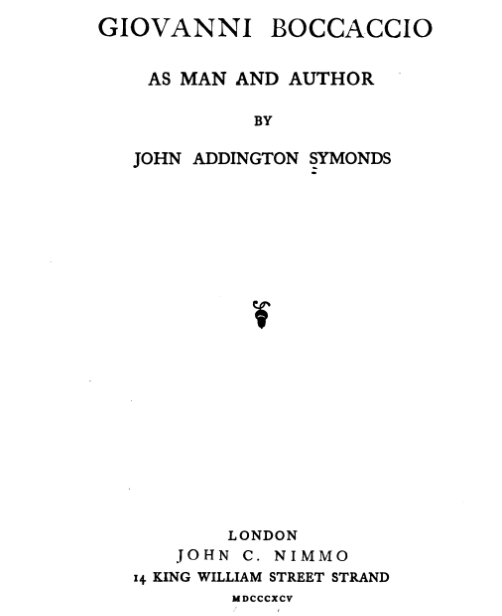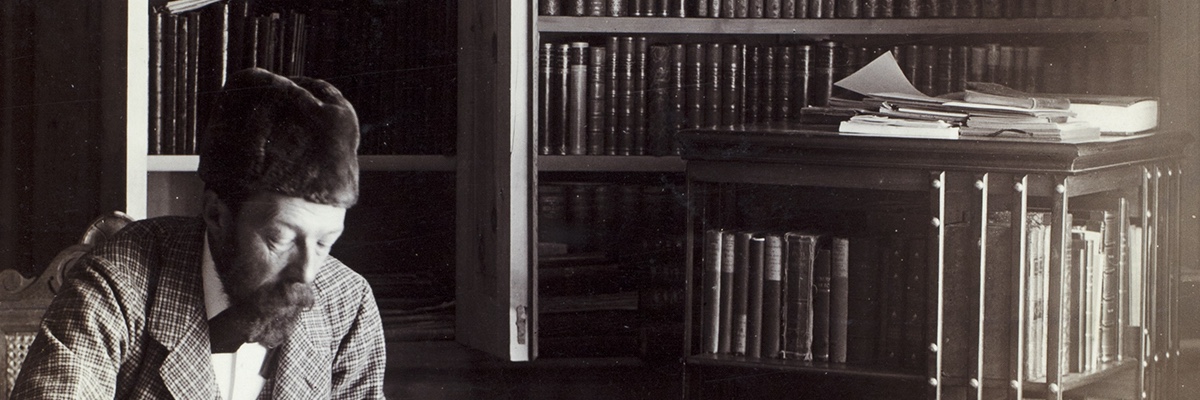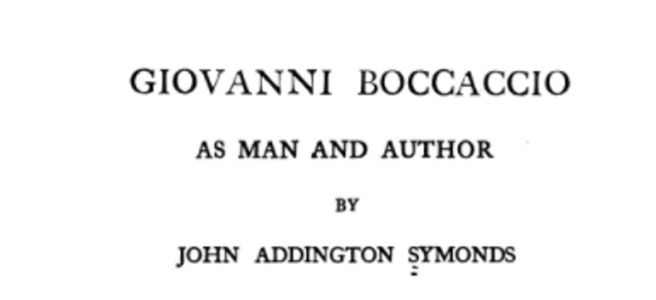Over the course of his career, one curious writer Symonds referenced frequently was Giovanni Boccaccio, a fourteenth-century Italian poet and prose writer famous for works such as The Decameron. Not only is Boccaccio discussed among other famous Italian authors, Dante and Petrarch, in the “Italian Literature” volume of his Renaissance in Italy series, but Symonds also wrote an essay about Boccaccio titled “Giovanni Boccaccio as Man and Author.”
This essay in itself is curious, its earliest publication being a posthumous 1895 edition. The only reference to the manuscript in Symonds’s Memoirs is a “long introduction to Boccaccio for Vizetelly” that he wrote in 1888 (Memoirs, 444). According to the footnotes, this was ultimately published by John C. Nimmo, not Vizetelly (Memoirs, 460 n135).

Bibliographic details aside, Boccaccio, ending the “first and most brilliant age of Italian literature,” was, alongside Dante and Petrarch, one of the writers ushering in a modern form of Italian literature (Symonds, Renaissance in Italy, 3). Symonds states:
Dante took for his province the drama of the human soul in its widest scope; Petrarch takes the heart of an individual man, himself; Boccaccio takes the complex stuff of daily life, the quicquid agunt homines of common experience.
Giovanni Boccaccio As Man and Author, 3
In addition to their different subject matters, the men themselves had drastically different upbringings: Dante grew up as Florentine nobility, Petrarch grew up middle class, and Boccaccio was born into the lower class from parents of no consequence, although Symonds notes that his class became the ascendant class in Florence (As Man and Author, 4-6).
This considered, then, the differences between them are clear. Symonds made his interest in Dante and his Inferno clear in the Memoirs, but his interest in Boccaccio is rather curious. In his essay on Boccaccio, he ranks Boccaccio below Dante and Petrarch in “force and character and quality of genius” (As Man and Author, 6). While Symonds gives praise to the originality and descriptiveness of his writing, he notes:
…judged as poems, they leave much to be desired. The style is never choice, and often simply vulgar. In some parts the execution is unpardonably slovenly.
As Man and Author, 50
He goes on to mention that Boccaccio’s work often feels rushed and there is an “absence of loving care” (As Man and Author, 51).
This critique reveals a marked contrast to Symonds’s own approach to writing, which he details as:
Concentration lies beyond my grasp. The right words do not fall into the right places at my bidding. I have written few good paragraphs, and possibly no single perfect line. I strove, however, to control the qualities I knew myself to have, to train and curb them, to improve them by attention to the details of style.
The Memoirs of John Addington Symonds, 418
Symonds consistently reveals himself to be a writer concerned with details and giving his writing due attention (which can be seen in the footnotes to the Memoirs, let alone his poetry). This raises a question: why did Symonds devote an entire essay to an author whose work he is often very critical of?
It’s worth noting that, while he claims Boccaccio fails to be an artist when it comes to his poetry, he also says that he himself lacks the “inevitable touch of the true poet, the unconquerable patience of the conscious artist” (Memoirs, 418). In other sections of the Memoirs, he notes times he doubted his own artistic abilities. This seems to demonstrate a lack of superiority or hypocrisy when critiquing Boccaccio’s work; the qualities he claims Boccaccio lacks are qualities he himself tries to achieve in his own writing.
Despite these critiques, Symonds does give praise to Boccaccio’s finer qualities. To return to his comparisons between the three authors, despite Boccaccio’s ranking, he was the most influential of them:
He alone grew with the growing age, in his substitution of sensual and concrete for mystical and abstract ideals, in his joyous acceptance of nature and the world…
As Man and Author, 7
This statement alone offers some insight into the appeal of Boccaccio for Symonds, as Symonds establishes himself frequently in his writing as someone wont to be appreciative of nature and beauty, evident by diaries he carried during his travels, who aims to write vividly enough to fully utilize “such certainty of touch” and create perceptions for a reader (Memoirs 417).
In addition, he says of Boccaccio’s sonnets:
Their artistic inferiority secures for them a certain air of correspondence with the truth.
As Man and Author, 26
This is interesting because truth is something Symonds grappled with in his literary pursuits, particularly when crafting his Memoirs, where he creates a balance between his examinations of self and the minor day-to-day details. When he discusses his work in the Memoirs, he says:
It has been my destiny to make continual renunciation of my truest self, because I was born out of sympathy with the men around me, and have lived a stifled anachronism.
Memoirs, 418
The desire for truth juxtaposed with the frequent personal unattainability of it for Symonds might also suggest why Boccaccio’s own achievement of veracity in his work was interesting to him.
Symonds’s literature on Boccaccio is fascinating because, on the surface, it may appear that Boccaccio’s work might be too far removed from Symonds’s own to have been of any interest to him. It’s clear, however, that the critiques he offers are not particularly damning, as he himself is not a perfect writer. It’s possible that, besides making Boccaccio the subject of an essay due to his fame and influence, he saw Boccaccio’s work, as flawed as it was in Symonds’s eyes, as a tool through which he could analyze his own flaws as a writer. These comments that Symonds has made, about Boccaccio’s work and his own, can be used to reveal more about him as man and author.
WORKS CITED
Symonds, John Addington. Giovanni Boccaccio As Man And Author. London: J.C. Nimmo, 1895.
Symonds, John Addington. The Memoirs of John Addington Symonds: a Critical Edition. Edited by Amber K. Regis. London: Palgrave Macmillan, 2016.
Symonds, John Addington. Renaissance In Italy: Italian Literature: In Two Parts. London: Smith, Elder & co., 1881.

